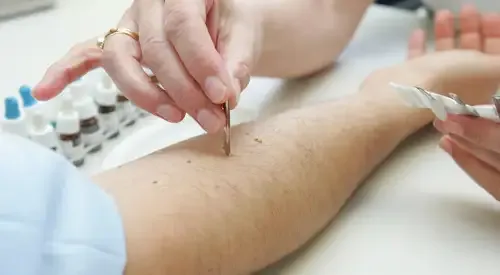Eczema
"Patients with allergic contact eczema will improve substantially if they change their habits and use protective measures when exposed to irritants".
DR. JAVIER ANTOÑANZAS
SPECIALIST. DERMATOLOGY DEPARTMENT

Eczema is a flaking and itchy process that affects the skin.
It can be divided into two groups: atopic eczema, characterized by the presence of scaly and reddish skin lesions, mainly in the flexures of the extremities, and which is usually associated with different allergic processes (asthma, hives, allergic rhinitis...), together with dry skin.
There is a second group called contact eczema, characterized by the appearance of scaly plaques on the skin surface.
All patients exposed to substances with a significant irritant capacity may present ortho-allergic contact eczema. No sensitization period is required. It is characteristic within this group the so-called housewife's hand dermatitis, produced by the continuous use of very irritating soaps.

What are the symptoms of eczema?
The characteristic skin lesions of the different eczemas are reddish and scaly plaques in different body areas, and associated with significant itching.
If in some cases an important inflammatory reaction is produced, instead of circumscribed flaking plaques, the presence of vesicles with serous content can be observed inside.
Among the symptoms of eczema are the following:
- The skin is constantly dry.
Red, itchy areas, which usually worsen during the winter.- The affected area may become moist and exude if the patient scratches himself.
- Among young children it is more common on the inside of the elbows, as well as on the wrists and behind the knees; it can also appear on the neck, ankles, feet and other areas of the body.
- In older children it can appear on the hands, feet and eyelids.
- In babies it sometimes starts on the cheeks.
- After a while the skin may change color and become thicker.
The most common symptoms are:
- Reddish and flaky plates.
- Itching.
- Dry skin.
Do you have any of these symptoms?
You may have eczema
What are the causes of eczema?
Although the ultimate mechanisms involved in each of the types of eczema are different, there is an alteration in the white blood cells - specifically the lymphocytes - in each of them, which facilitates an abnormal immune reaction to substances external to the individual.
In childhood atopic eczema, possible triggers such as infectious processes and certain foods must be ruled out. Eczema usually manifests itself in the following circumstances:
- When the skin comes into contact with an irritating substance, such as soap or chlorine.
- When the skin is exposed to water for a long time without applying a moisturizer afterwards.
- When there are seasonal changes or changes in the humidity of the air.
Who can suffer from eczema?
Atopic eczema can first appear in young children, at a few months of age, and in these cases the skin lesions usually have a predilection for the scalp, face and diaper area.
In most cases, when puberty arrives, atopic eczema disappears, leaving only dry skin, and sometimes other manifestations of atopy - hives, allergic rhinitis, asthma, etc. -. More rarely, atopic eczema may appear in adulthood for the first time.
On the contrary, allergic contact eczema will only appear in those patients who are sensitized - allergic - to a specific substance - allergen -, who will present the skin lesions every time they are exposed to it. A period of prior sensitization - contact with the problem substance - is necessary before allergic contact eczema develops. For example, allergic contact eczema to jewelry is common in patients allergic to nickel.
How is eczema diagnosed?

The diagnosis of suspicion of each of the forms of eczema should be through the clinical history.
The diagnosis of atopic eczema may include:
- Family history.
- Personal history of allergy or asthma.
- Blood tests.
In allergic contact eczema, epicutaneous contact tests should be performed to determine the allergen responsible for the eczema plaques that the patient has.
How is eczema treated?
The treatment of allergic contact eczema will be to avoid the substance to which the patient is allergic.
In patients with atopic eczema, any food that may be involved will be removed, and any intercurrent infectious processes will be treated.
In addition, once the triggering factors have been detected and eliminated, treatments such as corticosteroids -topic or systemic-, systemic antihistamines, moisturizing creams and antibiotics are indicated.
In those patients with orthoallergic allergic eczema, recommendations aimed at protecting the affected areas should also be given to the patients, and in particular, to housewives who are recommended to wear gloves when performing household tasks.
Keep your skin moisturized:
- Follow the dermatologist's recommendations for daily hygiene, since the needs will vary according to the type of skin.
- Avoid harsh soaps.
After bathing, dry gently with a towel, without rubbing, to remove excess water and leave the skin a little moist.- To help keep skin moisturized, apply a fragrance-free moisturizer to the entire body right after bathing and several times a day.
- Apply the treatment prescribed by your dermatologist during the indicated period.
The Department of Dermatology
of the Clínica Universidad de Navarra
The Department of Dermatology of the Clinica Universidad de Navarra has extensive experience in the diagnosis and treatment of dermatological diseases.
We have extensive experience in highly precise surgical treatments, such as Mohs surgery. This procedure requires highly specialized personnel.
We have the latest technology for the dermo-aesthetic treatment of skin lesions, with the aim of achieving the best results for our patients.
Diseases we treat

Why at the Clinica?
- Experts in Mohs Surgery for the treatment of skin cancer.
- We have the best technology for dermo-aesthetic treatments.
- Safety and quality assurance of the best private hospital in Spain.








